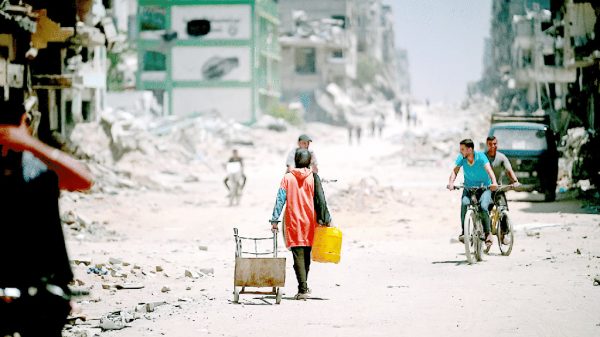The origin of this day is meant to highlight the huge number of immigrants scattered all over the world and the issues related to their interests. On 18 December 1990, the UN General Assembly adopted an international agreement in the form of resolution 45/158 to provide adequate security for migrant workers and protect the fair rights of their families.
Basically, countries’ benefit economically from the remittances sent by immigrants. For a developing country like Bangladesh, remittances are one of the main sources of foreign exchange, which is the foundation of development, the lifeblood and golden ladder of realisation of dreams and one of the important driving forces of the country’s economy. Its role and importance far outweighs the development assistance received from various countries and organisations, and much more stable than the flow of private credit and portfolio equity. The contribution of remittances to country’s economic development is 12 per cent of the total GDP.
In terms of remittance earning, Bangladesh ranks seventh in the world. Remittances sent by expatriates have been able to make a significant contribution to the economic development of Bangladesh. The amount of foreign currency that these expatriate workers are sending home is half of the total export income of the country. Due to the expatriates, the foreign exchange reserves of Bangladesh Bank is now at a respectably high position. Thanks to this contribution, banks have also been able to overcome the liquidity crisis and build a stable deposit. The remittance money has created small entrepreneurs and the country’s rural economy is in a strong position.
However, strong remittances require skilled and trained manpower and there is a huge demand for skilled and trained workers abroad. It is necessary to acquire skills through training but many workers migrate with very little know-how or skills. In most cases, due to special needs of Bangladeshi workers in the foreign labour market, they are often migrating being completely incompetent. As a result, they are not able to engage in their desired work. Also, due to ignorance and lack of skills, they are subjected to various abuses and torture. It is possible to prevent these with a little awareness. Just as getting more skills and trainings can help build their self-confidence, it also can give them the courage to fight against any human rights violations and abuses.
In fact, the important thing that immigrants should consider before going abroad is to have a good idea about the nature and type of work they are going abroad for and to have interest in that work. After reaching the destination country, they should be able to efficiently fulfil the responsibilities entrusted to them, sharpen and enhance their skills through further training, maintain good relationships with employers and demonstrate appropriate behaviour, respect and adhere to the law, order and culture of the destination country. They should exclude criminal, illegal and anti-social activities in the destination country, make savings diligently and send their hard earned money to their families in the country. The migrant workers can increase the respect and reputation of the country by showing their skills and expertise abroad.
In the age of industrial revolution, skill was considered as a tool of work. The faster technological knowledge and skills can be developed in a technology dependent world, the easier it will be to keep pace with the times. But sadly, in the education curriculum of Bangladesh, emphasis is more on theoretical knowledge than practical knowledge to develop skills in technical education. But in foreign countries, most of the recruitment is done on the basis of skills.
The Bureau of Manpower Employment and Training, one of the leading institutes working in Bangladesh for the development of technical skills, has 71 technical training centers all over the country. The government has plans to take the branches of these training centers to the upazila level. But there is a dearth of skilled trainers to run these technical institutes. In this case, the government should increase the number of training centers to develop more skilled trainers.
Not only is there a lack of technical knowledge but many immigrants have little idea about the language, laws and climate of the destination country. Research on more than 100 migrants who have worked abroad before shows that they lack technical skills, cultural awareness, communication skills, physical structure of construction workers, proper understanding of hygiene and sanitation including diet, proficiency in operating machinery and professional attitude. The funny thing is that despite all these shortcomings and weaknesses, Bangladeshi migrant workers continue to increase the country’s foreign currency reserves by going abroad.
However, with the development of technology in mind, future immigration policy needs to be planned. Therefore, if the requirement of technological knowledge does not penetrate into our aspirant labour migrants, our labour market may face serious threat. Saudi Arabia is a big labour market for us who have already started a program where at least 20 per cent of Saudi citizens will work in the factory. As a result, 12 types of jobs for expatriates have been declared closed. So the big challenge after Covid-19 for countries is to start turning the economy around again.
New labour markets are being introduced in different countries but in this case the use of technical skills will be of maximum requirement. At one time in the villages a lot of labour was required for threshing paddy. Now, a single machine can be used by many farmers which reduces labour cost and time. The man who owns the machine or has mastered the technology to operate the machine will survive in the competition, otherwise one will lose the current war. So, we have to introduce advanced technology skills training to those who want to go abroad.
Due to their knowledge of technical skills, many Indians are working in our country with a good reputation, and also showing great skills in corporate companies in America and Europe. In order to keep the wheels of the war-torn economy in motion, the migration of Bangladeshi workers to the Middle Eastern countries started from 1976, just after the journey of the state called Bangladesh. According to the Ministry of Finance, at present more than 12.5 million people are working in more than 174 countries enriching our economy. Most of them are working in Middle Eastern countries.
Out of the record number of 10,08,525 workers from Bangladesh in 2017, only 4,34,000 skilled workers migrated to different countries of the world. In 2018, the number of skilled workers was 3,18,000 out of 8,34,181 immigrants. On the other hand, out of 7,00,159 migrants in 2019, the number of skilled workers was 3,04,000. Considering the low skills, it can be seen that instead of four lakh low skilled workers in 2017, in 2018 and 2019 respectively, 2.83 lakh and 1.97 lakh low skilled workers went abroad for work. On the other hand, the number of semi-skilled workers decreased from 1.55 lakh in 2017 to 1.17 lakh in 2018 and increased slightly to 1.42 lakh in 2019. Despite the target of adding 7.5 lakh new workers to foreign employment from Bangladesh in 2020, only 2,17,669 workers could be sent due to the Covid-19 epidemic.
As a result, a large part of the workforce lost the opportunity of foreign employment. On top of this, more than 3.5 lakh workers have returned to the country after losing their jobs due to the coronavirus, which is a big loss in terms of labour migration from Bangladesh.
The United Nations immigrant affairs authority International Organisation for Migration (IOM) released a report on June 16, 2020, entitled ‘Migration in Bangladesh, Family Remittances, Assets and Skills Classification’. The report reveals the results of a survey of 1,000 remittance-dependent households conducted in 2019, and quality discussions with key partners. According to the survey, highly skilled workers send more money to the country than low skilled workers. As a result of the increase in efficiency, remittances have increased at a monthly rate of about US$ 255 between 2009 and 2019. How remittances will be invested and saved depends on the skills of the migrants. Skilled immigrants urge family members to invest in bonds as savings. Unskilled migrants, on the other hand, spend their remittances on loan repayments. Highly skilled migrant workers are employed in well-paid jobs and send more remittances than low skilled workers over a long period of time.
The study found that 98 per cent of Bangladeshi migrant workers and remittance senders are men. About 12 per cent of these migrant workers did not go to school at all and about 80 per cent went to secondary school. Of the migrant workers surveyed, half (49 percent) worked as employees of an organisation or company and about a quarter (26 per cent) worked as day labourers, including part-time workers. Immigrant workers send less money or are less economically profitable than skilled workers in other countries, as the amount of money sent by unskilled and less skilled workers is much less than that of skilled workers. According to the report, remittances are mainly used to meet short-term needs and are rarely used to diversify assets or create financial resilience, which further increases the family’s reliance on remittances. The low economic knowledge of expatriates and their families puts them in a precarious position in terms of sustainable income, remittance management and wealth creation.
The research suggests that, first of all, investments should be made to develop gender sensitive skills and build the family’s financial knowledge and ability to manage remittances. Second, there is a need to invest in education and skills development so that higher skilled migrant workers can earn more money and break the cycle of debt. Third, necessary steps need to be taken to reduce the risk and provide financial independence to ensure improved debt management and formalisation of savings.
Fourth, policies need to be adopted to increase the economic inclusion of women so that they have a positive impact on all aspects of wealth creation and economic development, considering the size of the economy and sustainable strategies. Finally, the study recommends building partnerships to provide gender-sensitive economic education and counselling to immigrants and remittance recipients.
Bangladesh’s reserves have increased due to remittances sent by migrants at a time when the wheels of the economy of many developed countries have come to a standstill during the global coronavirus epidemic. As remittance inflows began to decline in early 2020, the World Bank feared that remittances to South Asia were likely to decline. But rejecting that forecast, remittances to the country reached US$ 22 billion in 2020, which is 6.6 per cent of GDP. In 2019, the amount of remittances there was US$ 18.36 billion. According to the latest report by the Global Knowledge Partnership and Development, Bangladesh is the seventh largest remittance sending country among low and middle-income countries, contrary to the eighth largest (France received about US$ 24 billion in remittances, which ranked the country seventh in the World Bank report). India topped the list with US$ 83 billion, followed by China at US$ 60 billion, Mexico at US$ 43 billion, the Philippines at US$ 35 billion, Egypt at US$ 30 billion and Pakistan at US$ 26 billion. Bangladesh ranks eighth if France is placed seventh, in the changed situation of 2020, it is positive for Bangladesh. During this period, India’s remittances, which were in the first and second place, decreased by 0.2 per cent, while that of China decreased by about 13 per cent. But the remittance flow of Bangladesh has increased by about 35 per cent. Nigeria’s remittances, which are second only to Bangladesh’s, have declined by 27.7 per cent, proving that 2020 was a challenging year for expatriate income.
As a result of the huge number of unskilled workers going abroad from Bangladesh through brokers, only the number of expatriates is increasing. But remittances are not increasing according to the number of labour. Most of these unskilled workers come from the rural poor, by tempting them in various ways, the middlemen are taking large sums of money. They can’t earn the money they spend to go abroad even if they work hard.
The standard of Bangladeshi workers is far below international standards. If this situation cannot be changed, remittance flow will not increase even if millions of workers go abroad. If the quality is not fixed, the country’s labour markets may have to lose. The value of unskilled or semi-skilled workers in the world labour market is steadily declining. On the other hand, the demand for skilled and trained manpower is increasing rapidly. Therefore, as in the formation of the country, there is no alternative but to change the conventional education system to increase employment abroad. We need to adapt our manpower to the demands and changes of the manpower importing countries. This requires skilled and trained manpower and they can turn the wheels of remittances. For this, the government has to take planned steps to build skilled manpower to support development.
The writer is a Banker





























Leave a Reply